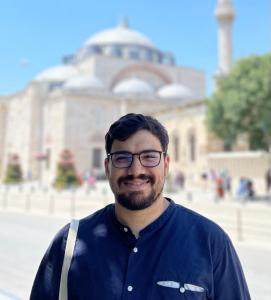Mehmet Emin Gulecyuz

Emin is a PhD student in Islamic studies and a 2022 recipient of the Ibrahim Rashed Summer Research Grant in the Islamic Religious Sciences.
Thanks to the Ibrahim Rashed Summer Grant, I will be able to study primary source texts in Arabic and Persian on Islamic theology, Sufism, and Islamic jurisprudence. Before embarking on a year-long manuscript research in Istanbul, the Grant will allow me to begin my research in summer and study with private tutors.
What does your work focus on / revolve around?
My research focuses primarily on Islamic philosophical and mystical theology in broad terms. More specifically, I study problems and controversies in Islamic theology in the late medieval period (i.e. the thirteenth through fifteenth centuries), with a focus on Asia Minor and Egypt. My dissertation is a comprehensive study of the life and mystical theology of an influential fourteenth- and fifteenth-century Anatolian thinker Molla Fenari, and how he inherited and dealt with multiple theological perspectives including Avicennan philosophy, kalām theology, and Sufi metaphysics.
What is a favorite course you have taken at the Divinity School and what made it a favorite?
While it is hard to single out one course, I can without hesitation name Professor James Robinson’s seminar on Maimonides’ Guide of the Perplexed. What made it a favorite are several things: First, contrary to what I had expected before taking the seminar, we read the entire Guide, cover-to-cover. It was such an ambitious and at the same time enriching project. Secondly, it was a multi-lingual seminar, so to say. The text was assigned and read-aloud in class in English translation. While this could be a reason for a less rigorous graduate level seminar, -again to my surprise- it lifted the language barrier and turned out to give a great chance for over forty students from different majors and programs to reflect on and discuss Maimonides’ opus magnum. I myself could follow the book from the original Arabic (in Arabic letters), with Professor Robinson and other participants referring to the original Judeo-Arabic texts when relevant. Thirdly, it helped me develop an important area of interest: medieval Judeo-Arabic literature, motivated me to learn Judeo-Arabic reading (done) and classical Hebrew (in the future). Last but by no means the least, I can’t imagine a course by Professor Robinson to be less than favorite!
What is your favorite part of campus? Why?
I think I can only speak of favorite parts in plural. First, Swift Hall is of course where I feel home. At the height of the pandemic, I taught a year-long language course and was given an office in Swift’s basement. At the time, Swift was almost deserted; and seeing it coming back to life the following year was an event of resurrection that I will never forget.
When it comes to where I have spent most of my time on campus so far, it is definitely the fourth floor of the Reg. The vast majority of the books I need for my studies are within an arm’s reach there. After several hours of reading and writing on a desk near the shelves, the loveliest thing to do is to find a comfortable armchair near the south wing windows and relax while enjoying the inspiring view of the Cobb Gate. I hate to think how much I will miss this ritual when my time is up at UChicago!
What is an aspect of life at the Divinity School or in Hyde Park that you enjoy?
For the better part of my adult life, I have been interested in acquiring books. Of course, this interest is dependent on financial means; and a student’s budget has its strict limitations. An aspect of life in Hyde Park that I particularly enjoy is the availability of books: used books for affordable prices or those given away for free! I fell in love with the traditional Hyde Park Used Book Sale organized every fall, and I look forward to its revival after two years of pandemic disruption. The Regenstein Library’s book resale has been something of a festivity for me twice a year. Besides these, I stumbled upon very important titles here and there, on given-away book shelves or in boxes on hallways or in Swift’s student lounge. And many of those books were previously owned by current or retired faculty, adding to their value as UChicago memorabilia in my personal collection. I must also mention Powell’s Books Chicago, its 1st-of-the-month sale and annual midnight madness! All in all, the life in Hyde Park is an inescapably bookish one and I love it!

